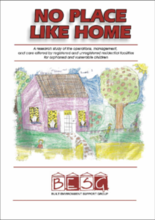The study observed 6 institutions, 3 registered, 3 unregistered, and evaluated financial sustainability, methods of managing care, impacts on children, whether the unregistered institutions are serving a need, and options for unregistered institutions. The article outlines the needs and rights of the child, as well as various methods of intervention such as home-based care and community-based support. The article also outlines case studies from each institution within the study.
The study found that financial sustainability is connected to governance and care issues, but that grants alone are not sufficient in ensuring good care. Management must be effective in order to prevent misuse of funds, poor monitoring, and abuse of children. Several factors influence the ability to positively affect children in institutions: physical environment, capacity of caregivers, monitoring of and interest in children, presence/involvement of social worker, nutrition, presence of a motherly figure. The conclusion also discusses the financial difficulties facing unregistered institutions in having access to both domestic and international grants and the sometimes sub-standard care provided in unregistered institutions. The study outlines several policy recommendations based on the findings of the research.
©BESG

